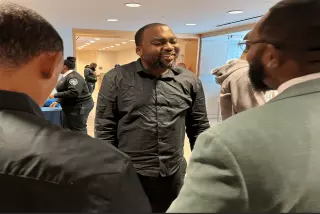Wounded Mother Delivers Healthy Baby : Crime: Violence is commonplace in economically hard-hit Bridgeport, Conn. And drugs are behind many of the shootings.
- Share via
BRIDGEPORT, Conn. — Alicia Sloan is one of the lucky ones. She was shot when she was six months pregnant, and both she and her baby survived.
She named her 5-pound, 12-ounce son Andre, after her brother, who wasn’t so lucky. Andre Moore, 27, bled to death from a stab wound to the chest Sept. 12, two days before Sloan gave birth.
The 25-year-old Sloan is sadly accustomed to violence. Two of her brothers and the father of her baby also have been wounded on Bridgeport streets. Her sister’s boyfriend was fatally shot in July.
“Every time you turn around, there’s somebody dying,” she said. “It don’t make no sense. Nobody seems to care.”
In Sloan’s world, as in so many American cities, violent crime is an accepted part of everyday life.
Sixty-three people were killed last year in Bridgeport, a poor city with 139,000 residents and a collapsed industrial base about 55 miles northeast of New York City. It was the highest number of homicides of any Connecticut city. This year’s count, as of late November, is 58.
Bridgeport’s 1992 homicide rate--45 people killed per 100,000 residents--compares to rates of 30 in Los Angeles, 57 in Detroit and 75 in Washington, D.C. Drugs are behind many of the shootings.
Sloan said she doesn’t hold out much hope that her neighborhood would be much affected by new laws such as the Brady Act, the handgun measure passed last month, or Congress’ $23-billion anti-crime package, which will put more than 100,000 additional police officers on the streets, add prison cells and ban sales of combat-style firearms.
“Banning guns is not going to solve anything because they can just get them anywhere,” she said. “Little kids are getting them, 10-year-olds are getting them, 12-year-olds are getting them.
“I believe if they had more police, that might help some, but they need to put them where they have the highest crime, and there aren’t enough police for that,” she said.
Sloan was sitting outside with some neighbors early on July 19 when a car drove by. Someone inside the vehicle opened fire.
Police said the bullet that hit Sloan was meant for Jose Olavarria, 21, a neighbor’s friend who was sitting next to her.
The bullet went through Sloan’s left leg, entered her lower abdomen and lodged in the wall of her uterus, less than an inch from her fetus. Doctors said it would be too dangerous to remove, so for two months Sloan carried the bullet along with her baby.
Four days before she gave birth, Sloan went to Bridgeport Hospital, thinking she was in labor. She wasn’t, but a 9-millimeter bullet came out in her doctor’s hand while he was examining her.
Dr. Robert Stiller, who delivered baby Andre on Sept. 14, five weeks premature but healthy, said the bullet probably would have caused severe damage to Sloan and the baby if it had not been deflected by first hitting her leg.
“We were surprised,” Stiller said. “Certainly anyone who gets shot and walks away from it is lucky. Unfortunately, what happened to her reflects the kind of violence that is going on in urban areas all over the country today.”
Police took the bullet for evidence and arrested three people in the shooting.
After the shooting, Sloan moved in with her mother in another neighborhood, with her baby and other children, Kashon, 9, and Waltecia, 4.
But that’s as far as she’s moving.
“I’m not going nowhere,” Sloan said. “It can happen anywhere. I’ve been here all my life. If I go somewhere else, I’ll have to learn their ways and what it’s all about there, so I’m just going to stay right here.”
More to Read
Sign up for Essential California
The most important California stories and recommendations in your inbox every morning.
You may occasionally receive promotional content from the Los Angeles Times.













